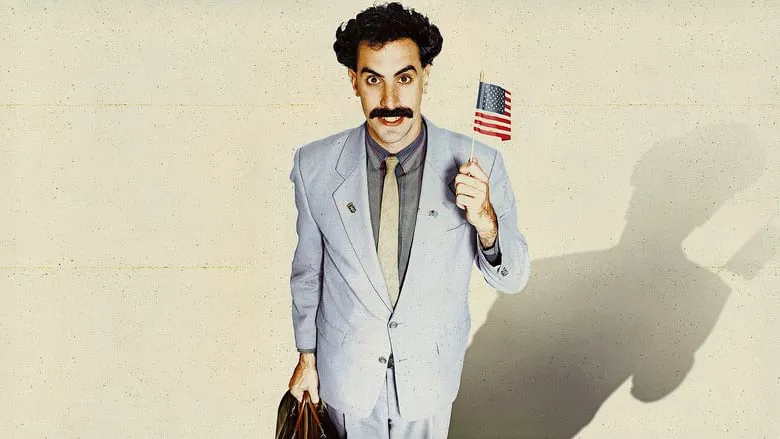Borat: Cultural Learnings of America for Make Benefit Glorious Nation of Kazakhstan

Plot
Borat: Cultural Learnings of America for Make Benefit Glorious Nation of Kazakhstan follows the fictional journalist Borat Sagdiyev, a man from Kazakhstan, as he travels across the United States to document various aspects of American culture. The film, written by Sacha Baron Cohen, Chris Weinberg, and Peter Baynham, is a satirical mockumentary that uses Borat as a tool to expose the darker side of American society, highlighting the country's prejudices and hypocrisies. Upon his arrival in America, Borat sets out to document the customs of American women, and as he travels, he encounters a range of individuals who are oblivious to his true intentions. In a hotel elevator, Borat encounters a number of female guests who are immediately drawn to him, and he sets out to charm them with his Kazakh hospitality. This sets the tone for the rest of his journey, as Borat uses his charm, or rather the lack thereof, to extract information about the women he encounters. Borat's arrival in the heart of America is met with a mixture of excitement and suspicion. He is seen as an outsider, a foreigner who is not quite sure of the rules and customs of American society. This confusion leads to a number of hilarious misunderstandings, as Borat struggles to navigate the complexities of American culture. One of the most memorable incidents in the film occurs when Borat visits a rodeo in the southern United States. He is immediately drawn to the rodeo competitions, and as he watches the cowboys at work, he decides to participate. With his Kazakh background and complete lack of experience with cattle, Borat is not exactly the natural choice for a rodeo rider. However, he is determined to participate, and as he rides a bull, he exposes the true nature of American culture, revealing a deep-seated fear of the Other. Borat's interactions with real people are often marked by his outrageous suggestions and questions. He asks if it's acceptable to urinate on the women he meets, and he inquires about the etiquette surrounding the treatment of horses. These suggestions and questions are often met with confusion, amusement, and sometimes even outrage. However, it's not just Borat's outrageous behavior that sparks controversy. It's also his uncanny ability to bring out the worst in people. As he traverses the country, he encounters individuals who reveal their true prejudices and hypocrisies. He meets a woman who is outraged by the suggestion that women have a place in the workplace, and he encounters a number of individuals who believe that people of different races and ethnicities are not equal. Through Borat's interactions with real people, the film exposes the darker side of American culture, revealing a number of prejudices and hypocrisies that lie beneath the surface. However, it's not just a straightforward expose of American culture. The film is also a clever subversion of the documentary genre, as the real people who appear in the film are unwittingly manipulated by Borat into behaving in a particular way. One of the most striking aspects of Borat is the way it uses satire to comment on the excesses of American culture. As Borat travels across the country, he encounters a number of individuals who embody the excesses of American society. He meets a group of fraternity brothers who embody the excesses of American masculinity, and he encounters a number of individuals who have made fortunes through sheer luck and circumstance. However, as Borat's journey comes to an end, it becomes clear that the true target of the film's satire is not just American culture, but also the filmmakers themselves. Borat is a clever subversion of the documentary genre, and it challenges the idea that documentary films are objective records of reality. Instead, it reveals the film as a constructed reality, one that is shaped by the filmmaker's vision and perspective. The film's final scenes are a clever commentary on the nature of documentary filmmaking. As Borat reflects on his journey across America, he comments on the way that the film has been constructed, using footage shot from inside his head to reveal the inner workings of his mind. This clever twist challenges the idea that documentary films are objective records of reality, and instead reveals them as carefully constructed narratives that are open to interpretation. Ultimately, Borat: Cultural Learnings of America for Make Benefit Glorious Nation of Kazakhstan is a film that is as much about the filmmakers themselves as it is about the people they encounter. It's a clever subversion of the documentary genre, one that challenges the idea of objectivity and instead reveals the constructed nature of reality. As Borat rides off into the sunset, it's clear that the film is not just a comedy about American culture, but also a searing indictment of the excesses of modern society.
Reviews
Recommendations





